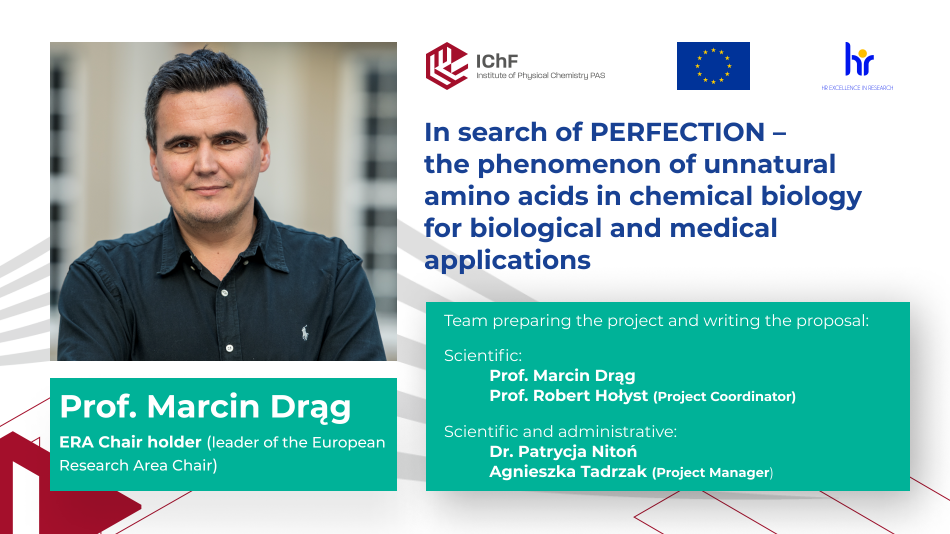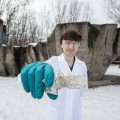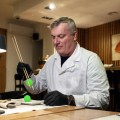The Institute of Physical Chemistry PAS has won the European Commission's ERA Chairs grant, the project will be led by Prof. Marcin Drąg
Reading time: about 7 minuts

The Institute of Physical Chemistry, Polish Academy of Sciences (IChF) has become one of two Polish winners of the latest edition of the prestigious ERA Chairs grant at the European Commission, receiving support of €2.5 million.
ERA Chairs (European Research Area Chairs) is an initiative of the European Commission under the Horizon Europe program, aimed at raising the level of research in European Union regions with limited research and innovation resources. The program enables outstanding scientists and managers to form research teams that develop key areas of research relevant to the development of local institutions, the country and Europe as a whole. As part of the project - “In search of PERFECTION: unnatural amino acids in chemical biology for biological and medical applications”, the Institute will establish a new unit - the Department of Chemical Biology for Biological and Medical Applications. It will be headed by Prof. Marcin Drąg, a respected chemical biologist, Foundation for Polish Science Award laureate (Polish “Nobel”) and inventor of a technology platform that uses natural and unnatural amino acids to monitor the activity of proteolytic enzymes (proteases).
The project opens up new avenues of research on proteases - enzymes crucial to biological processes and medical diagnostics. Proteases are a group of enzymes that play a key role in many biological processes in humans as well as in virtually all living organisms. They can serve as disease indicators (markers) (e.g., steroid specific antigen) or be involved in the progression of neurodegenerative diseases. An increase in their levels or activation is also observed in cancers, bacterial or viral infections. All this makes them excellent instruments for disease diagnosis and treatment. The use of unnatural amino acids for this purpose, i.e. amino acids that do not occur naturally in the body, increases the efficiency and accuracy of diagnosis or therapy, not least because it enables the creation of ultra-selective molecules, thereby reducing the possibility of affecting other biological processes in the human body. The technology can therefore support the development of new drugs or diagnostics for many types of incurable diseases. Its potential is best demonstrated by work on a drug against the SARS-CoV-2 virus during the recent pandemic. Using this technology, Prof. Marcin Drąg and his team characterized the key enzyme of SARS-CoV-2, and the results of this research, published in Nature Chemical Biology (Rut et al., 2021), have been made publicly available and downloaded more than 110,000 times from the bioRxiv platform, paving the way for the development of an effective drug against the disease. - “The COVID-19 pandemic and the invention, so far, of the only effective drug for SARS-CoV-2, which is Paxlovid, showed how enormous potential lies in unnatural amino acids as key structural elements of future drugs,” said Prof. Marcin Drąg
The project will enable the Institute to expand its research activities and develop diagnostic and therapeutic tools, supporting the advancement of science and the improvement of health in Europe and the world. For the Institute, the new research area will act as an “umbrella”, linking the work of more than a dozen research teams from the ICHF and enabling collaboration on more complex chemical biology projects targeting the area of broader health. “The Institute has unique experience in developing medical diagnostic platforms, for example, based on microfluidic techniques and spectroscopic methods (diagnostics of bacterial infections, cancer diagnostics, organ-on-chip platforms). However, we have so far lacked a team working in the field of biochemistry and chemical biology that could inspire new diagnostic targets and develop innovative drugs. We hope to achieve a synergistic effect between the new team led by Professor Drąg and research groups already working at the institute.” – said Dr. hab. Adam Kubas, director of IChF.
Prof. Drąg will also inspire organizational changes that will allow the Institute to become firmly established in the new field of research and increase the chances of practical application of the results of this work. The project also aims to strengthen the position of the IChF as a reliable international partner in the new field thanks to the participation of more than 20 academic and business partners in the project, among them Stanford University School of Medicine, University of Massachusetts Amherst, University of California, Scope Fluidics or other biotech companies, as well as other renowned academic centers from Europe, the USA, Canada or Australia. The PERFECTION project, through open competitions of an international nature for research group leaders and members of their teams, will also allow the Institute to attract talented scientists to the Institute, increasing the chances of attracting external funding. This will be possible through the establishment of new programs to train young and experienced scientists in the area of developing new drugs and diagnostic tools. Project implementation will also be overseen by an International Advisory Board.
Such grant success was possible thanks to the cooperation of outstanding scientists: Prof. Marcin Drąg, a renowned chemical biologist, Prof. Robert Hołyst, former IChF director, and the experts of the Large European Projects Department - Agnieszka Tadrzak and Dr. Patrycja Nitoń. It was their joint commitment and determination that made it possible to obtain this grant, opening up new research opportunities for the IChF and strengthening the Institute's position on the international stage. This is particularly important given that previous editions of ERA Chairs have assumed that the applying unit first obtained the grant and only then sought suitable leadership candidates. In the current edition, the team leader had to be identified already at the project submission stage. What's more, the PERFECTION project received very good reviews, which further emphasizes its quality.
In Poland, so far only two scientific units, specifically two institutes of the Polish Academy of Sciences, have managed to win funding from this program twice - the Institute of Physical Chemistry, Polish Academy of Sciences and the Institute of Plant Genetics, Polish Academy of Sciences. In 2015-2021, with the support of the European Commission and the Ministry of Science and Higher Education, the IChF implemented the CREATE project. It resulted in the establishment of the International Centre for Translational Eye Research (ICTER) under the leadership of Prof. Maciej Wojtkowski. The project was awarded a “success story” by the European Commission, which confirms its particularly important for achieving the goals of the ERA Chairs program. ICTER continues its activities within the framework of the prestigious European Teaming grant, strengthening Poland's position on the map of European research in the area of new therapies and diagnostic tools to help with various visual dysfunctions.
The Institute of Physical Chemistry, Polish Academy of Sciences, has an ambitious goal in implementing the PERFECTION project - to create a unique research center in Poland dedicated to chemical biology, one of the fastest-growing and award-winning fields of science in recent years. Until now, there was no institute of the Polish Academy of Sciences hosting a research group dedicated to chemical biology. In fact, the potential of this field was confirmed by two Nobel Prizes in chemistry (2022 and 2024), which were strongly linked to applications in this discipline. The funding received from the European Commission provides a solid foundation for the project, and the Institute is counting on additional support from the Ministry of Science to take full advantage of its potential.
The PERFECTION project is also proof that it is possible to intentionally move experienced scientists within our country using prestigious grants from European funds to increase quality and competitiveness, the lack of which has been raised in recent years as one of the ills of Polish science. The ERA Chairs grant will also increase the competitiveness of Polish science on the international arena and open up new prospects for the economy by introducing innovative solutions at the borderline of chemistry and biology, which also fits perfectly with the current policy of the Ministry of Science and Higher Education of Poland led by Minister Dariusz Wieczorek, who stated in a recent interview that “We are committed to having Poles participate in key R&D teams on the international arena and to bringing more and more funds for science and innovation to Poland.”
Text: Agnieszka Tadrzak in cooperation with Prof. Marcin Drąg.
Note editor: Dr. Anna Przybyło-Józefowicz.
Graphic: Władysław Żolik.
- Date: 25.11.2024





